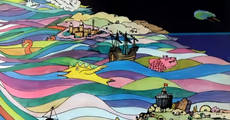Fernando Freitas
Musicians - Last Updated Abril 25, 2012

 Fernando de Freitas, full name Fernando Macedo do Freitas, was born in
Lisbon, in the parish of Santa Isabel, on September 1st, 1913.
Fernando de Freitas, full name Fernando Macedo do Freitas, was born in
Lisbon, in the parish of Santa Isabel, on September 1st, 1913.
Only at the age of 9 he started working at Coliseu dos Recreios in troupes of eccentric clowns, musical parodists, playing the violin and then also mandolin, banjo and ukulele. At the age of 12, he learned from his father to play Fado Corrido on the guitar, participating only at the age of 14 in Carnival plays (cegadas), then very popular in the capital.
Fernando de Freitas debuted as a guitarist in 1929, aged just 16, at "Solar da Alegria", by the hand of Alfredo Marceneiro. However, he dedicated himself to learning variations on the guitar under the influence of Armando Machado, while playing in some clandestine gambling houses, including "O Peras", in Rua de S. José, while also participating in cegadas.
From this moment, along with his participation in the cegadas, he began to dedicate himself to the guitar, performing successively in various cafés and retreats, and accompanying voices such as Ercília Costa, Adelina Fernandes, Maria Albertina, Teresa Gomes and Zulmira Miranda (also theatre actresses).
He performed at "Café Chic de Belém" and "Cervejaria Vitória" on Rua de São Paulo, "Café Mondego" and "Café Luso" in Travessa da Queimada. In 1935, with the advent of the Emissora Nacional, he accompanied with the guitarist Abel Negrão, Maria Teresa de Noronha, in her radio performances.
In 1937 he performed in Paris with Armando Machado and in 1944 he went to Brazil to accompany Amália Rodrigues at the Copacabana Casino.
He followed very closelyhe initial phase of Amália Rodrigues' career, to whom he composed two of her greatest successes: "Ronda dos Bairros" (with lyrics by Francisco Santos in alexandrinos) and "Sardinheiras" (with lyrics by Linhares Barbosa).
On "Guitarra de Portugal", from June 15, 1945, it reads: "When closing our newspaper, you must be taking the "Clipper" that will take you to Rio de Janeiro, the virtuous guitarist Fernando Freitas who will expressly accompany Amália Rodrigues, who is already in that country… ”In 1951 he returned to Brazil, on his own initiative, staying there for 14 years.
In 1965 he returned to Portugal, performing for a few years at "Adega Machado", then leaving for Spain where he spent three years accompanying Maria Dolores Pradera (whom they called Spanish Amália) who also sang fado. He accompanied Fernando Farinha on his tour of the United States of America and Canada in 1966, and also accompanied this artist to Argentina. He also composed, among other songs, those of "A Canção da Neve" (created by Berta Cardoso), "Fado Napoleão" (created by Frutuoso França), "Trem Desmantelado" (with lyrics by Carlos Conde), "Fado Barroca" and "Fado das Romarias".
From 1971 onwards, Fernando Freitas joined the permanent cast of Restaurante "O Faia", alongside Ilídio dos Santos, aka "Very Nice", Martinho d'Assunção and Orlando Silva, remaining there for 16 years (the latter practically blind), accompanying among others, Lucília do Carmo and Carlos do Carmo.
He was married to the fado singer Maria Girão. He is the father of singer and composer Fernando Girão, who has also been working with incursions in the area of fado.
Fernando Freitas died in Lisbon, on March 18, 1988.
Fernando de Freitas debuted as a guitarist in 1929, aged just 16, at "Solar da Alegria", by the hand of Alfredo Marceneiro. However, he dedicated himself to learning variations on the guitar under the influence of Armando Machado, while playing in some clandestine gambling houses, including "O Peras", in Rua de S. José, while also participating in cegadas.
From this moment, along with his participation in the cegadas, he began to dedicate himself to the guitar, performing successively in various cafés and retreats, and accompanying voices such as Ercília Costa, Adelina Fernandes, Maria Albertina, Teresa Gomes and Zulmira Miranda (also theatre actresses).
He performed at "Café Chic de Belém" and "Cervejaria Vitória" on Rua de São Paulo, "Café Mondego" and "Café Luso" in Travessa da Queimada. In 1935, with the advent of the Emissora Nacional, he accompanied with the guitarist Abel Negrão, Maria Teresa de Noronha, in her radio performances.
In 1937 he performed in Paris with Armando Machado and in 1944 he went to Brazil to accompany Amália Rodrigues at the Copacabana Casino.
He followed very closelyhe initial phase of Amália Rodrigues' career, to whom he composed two of her greatest successes: "Ronda dos Bairros" (with lyrics by Francisco Santos in alexandrinos) and "Sardinheiras" (with lyrics by Linhares Barbosa).
On "Guitarra de Portugal", from June 15, 1945, it reads: "When closing our newspaper, you must be taking the "Clipper" that will take you to Rio de Janeiro, the virtuous guitarist Fernando Freitas who will expressly accompany Amália Rodrigues, who is already in that country… ”In 1951 he returned to Brazil, on his own initiative, staying there for 14 years.
In 1965 he returned to Portugal, performing for a few years at "Adega Machado", then leaving for Spain where he spent three years accompanying Maria Dolores Pradera (whom they called Spanish Amália) who also sang fado. He accompanied Fernando Farinha on his tour of the United States of America and Canada in 1966, and also accompanied this artist to Argentina. He also composed, among other songs, those of "A Canção da Neve" (created by Berta Cardoso), "Fado Napoleão" (created by Frutuoso França), "Trem Desmantelado" (with lyrics by Carlos Conde), "Fado Barroca" and "Fado das Romarias".
From 1971 onwards, Fernando Freitas joined the permanent cast of Restaurante "O Faia", alongside Ilídio dos Santos, aka "Very Nice", Martinho d'Assunção and Orlando Silva, remaining there for 16 years (the latter practically blind), accompanying among others, Lucília do Carmo and Carlos do Carmo.
He was married to the fado singer Maria Girão. He is the father of singer and composer Fernando Girão, who has also been working with incursions in the area of fado.
Fernando Freitas died in Lisbon, on March 18, 1988.
Related Articles
Add Comment









